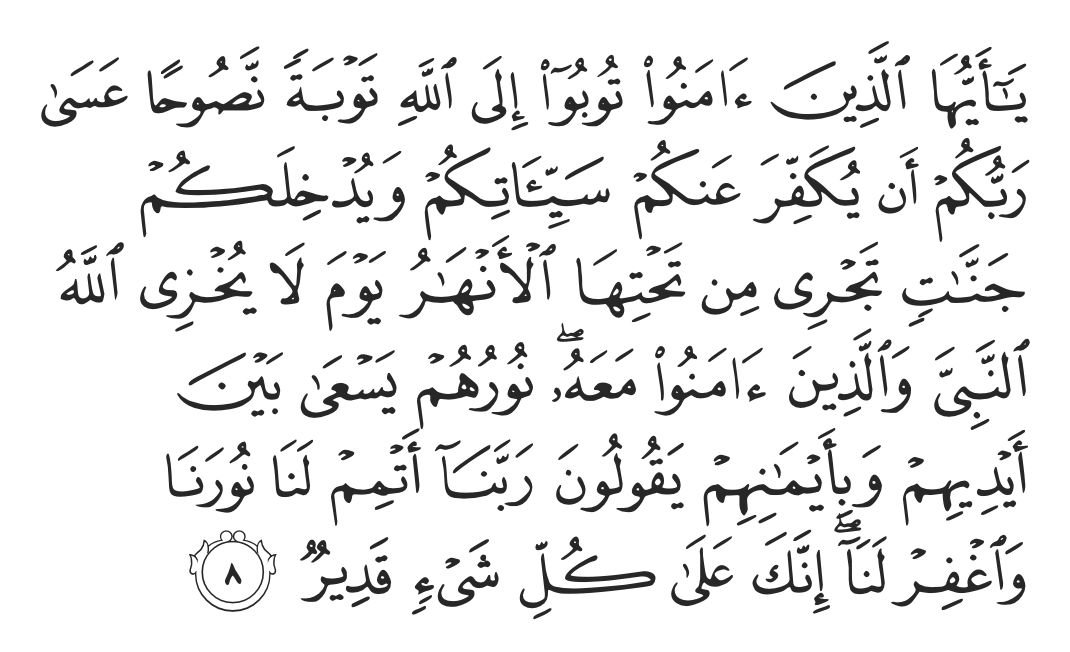Embarking on a Spiritual Adventure: Seeking God's Mercy and Paradise
Believers, turn to God in sincere repentance. Your Lord may well cancel your bad deeds for you and admit you into Gardens graced with flowing streams, on a Day when God will not disgrace the Prophet or those who have believed with him. With their lights streaming out ahead of them and to their right, they will say, ‘Lord, perfect our lights for us and forgive us: You have power over everything.’
In the hustle and bustle of our daily lives, it's easy to get caught up in the whirlwind of responsibilities, commitments, and distractions. But amidst this chaos, there's a call that resonates deeply within the hearts of believers—the call to turn to God in sincere repentance.
In Surah At-Tahrim (66:8) of the Quran, we find a verse that serves as a beacon of hope and guidance for every Muslim family and individual. It invites us to embark on a spiritual adventure, a journey that begins with repentance and leads to the boundless mercy of our Creator. Let's delve into this verse and explore the reflections it offers for Muslim families seeking to strengthen their faith and find their way to Paradise.
1. Sincere Repentance: The verse emphasises the importance of sincere repentance. It reminds believers that turning to God in repentance is a fundamental aspect of faith. No matter how grave our sins may be, God's mercy and forgiveness are always available to those who sincerely seek it.
2. God's Boundless Mercy: The verse underscores the boundless mercy of God. It tells us that God may cancel our bad deeds when we turn to Him in repentance. This is a powerful reminder that God's forgiveness knows no limits and that He can erase our past mistakes if we genuinely seek His forgiveness.
3. The Reward of the Righteous: The verse also paints a vivid picture of the reward for the righteous. It describes Gardens graced with flowing streams, symbolising the eternal bliss and tranquility that await those who believe and do good deeds. This imagery is meant to inspire believers to strive for righteousness in their lives.
4. The Day of Judgment: The verse alludes to the Day of Judgment when every soul will be held accountable for their deeds. It's a reminder that our actions in this world have consequences in the hereafter. As a Muslim family, we must prepare for that day by seeking God's forgiveness, living a righteous life, and imparting these values to our children.
5. Respect for the Prophet: The verse also highlights the honour and respect due to the Prophet Muhammad (peace be upon him). Believers are reminded that on the Day of Judgment, God will not disgrace the Prophet or those who have believed with him. This underscores the significance of following the Prophet's teachings and emulating his character.
6. Request for Spiritual Enlightenment: The verse ends with a supplication from the believers, asking God to perfect their lights and forgive them. This is a beautiful prayer for spiritual enlightenment and forgiveness. It reflects the humility and reliance on God that every believer, every family, should maintain.
In essence, this verse encourages believers to engage in sincere repentance, trust in God's mercy, work towards righteousness, and prepare for the Day of Judgment. It also serves as a reminder of the honour and respect owed to the Prophet Muhammad (peace be upon him) and the importance of seeking spiritual guidance and forgiveness through prayer.
As we embark on our spiritual adventure as Muslim families, let's remember that the journey of repentance is not a solitary one. It's a path that we walk together, as a family, as a community, seeking God's mercy and striving for righteousness. It's a journey that leads to the Gardens of Paradise, where the streams of God's blessings flow eternally.

